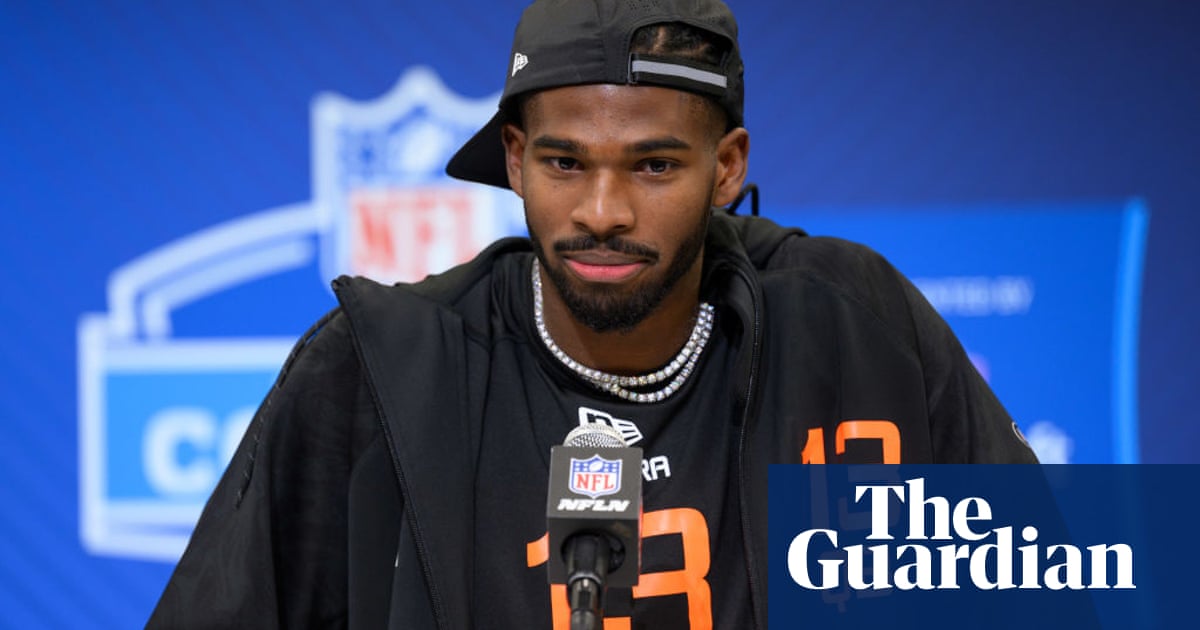Shedeur Sanders is still waiting – after three rounds of theNFLdraft, 102 picks and five quarterbacks selected ahead of Deion Sanders’s highly touted son.
The Colorado quarterbackwas widely considered a first-round talent. But his stunning slide continued on Friday night when his name wasn’t called in the second or third round.
Sanders was arguably the most recognizable college player in the country entering the draft – largely because of his father, Deion, the Pro Football Hall of Famer who brought an innovative, media friendly approach to college coaching at Jackson State and then Colorado. Shedeur Sanders played for his father at both schools and finished eighth in Heisman Trophy voting last season as the pair revitalized the Buffaloes program.
NFL talent evaluators were apparently less impressed than draft analysts realized. Few if any mock drafts had Jaxson Dart, Tyler Shough, Jalen Milroe or Dillon Gabriel getting picked before Sanders, but that’s what happened.
“Thank you GOD for EVERYTHING,” Sanders posted on X during the third round.
Sanders was initially rated by some draft analysts as a better QB prospect than Miami’s Cam Ward, who ultimately went No 1 overall to Tennessee. But as the draft drew closer, concerns began to emerge.
One issue: Sanders was sacked 94 times over his last two college seasons. There also were worries about his arm strength and questions about how well he would adapt to playing for someone other than his father. And given his high profile, teams may be reluctant to pick him if they view him as a backup.
For a few moments on Thursday, it appeared Sanders’ wait might be over when the New York Giants traded up to the 25th pick, but the team opted for Dart out of Mississippi.
The lone quarterback selection of Friday’s second round came when New Orleans passed on Sanders in favor of Shough, a 25-year-old who finished his college career at Louisville after stops at Oregon and Texas Tech. Shough was chosen 40th overall. Saints veteran quarterback Derek Carr has what general manager Mickey Loomis described as a “shoulder issue,” leaving his availability uncertain heading into offseason workouts.
The Seattle Seahawks took Milroe out of Alabama in the third round with the 92nd overall pick. Two picks later, the Cleveland Browns selected Gabriel, who played at Oregon last year after stints at Central Florida and Oklahoma. Cleveland had five picks in the first three rounds and has a clear need at quarterback after the team got little production out of Deshaun Watson, who will miss the upcoming season with a torn achilles tendon. Gabriel joins Kenny Pickett and 40-year-old Joe Flacco in the Browns’ quarterback room.
Pittsburgh were also considered a potential landing spot for Sanders, who visited the Steelers’ facility before the draft. The Steelers’ only quarterbacks are Mason Rudolph and Skylar Thompson after the offseason departures of Russell Wilson and Justin Fields, although there is speculation they could sign the 41-year-old Aaron Rodgers in the coming weeks.
The Steelers took Oregon defensive lineman Derrick Harmon with the 21st overall pick Thursday. They didn’t have a second-round pick, but Sanders was still available when their turn came again in the third round. Pittsburgh instead used the 83rd overall pick on Iowa running back Kaleb Johnson.
Another player regarded as a potential first-round selection had a longer wait than expected. Michigan cornerback Will Johnson, who was in the green room during Thursday’s first round, went to the Arizona Cardinals in the second round with the 47th overall pick. A reported knee issue caused Johnson’s stock to fall.
“It’s just frustrating,” Johnson said. “I know what I’m dealing with, and I know I’m healthy and I know how my body feels. I’m just going to go out there and show that on Sundays and show everybody what they missed out on.”
The second round featured several trades.
Seattle and Miami traded up to get picks early in the round. The Seahawks chose South Carolina safety Nick Emmanwori with the 35th overall pick. The Dolphins took Arizona guard Jonah Savaiinaea at No 37. Buffalo moved up 16 spots to take South Carolina defensive tackle TJ Sanders at No.41. The Bills dealt their 56th, 62nd and 109th picks to Chicago while getting the Bears’ 72nd and 240th picks in return.
TJ Sanders will have an immediate opportunity to make an impact with offseason free-agent addition Larry Ogunjobi expected to miss the first six games for violating the NFL’s performance-enhancing drug policy.
The second round also included the selection of three more players from national champion Ohio State, who had four players taken in the first round. The Buckeyes’ running back tandem went early in the second round, with Judkins followed by TreVeyon Henderson, who went 38th overall to New England. Indianapolis took edge rusher JT Tuimoloau at No 45.
Seven of the first 45 selections played at Ohio State.
